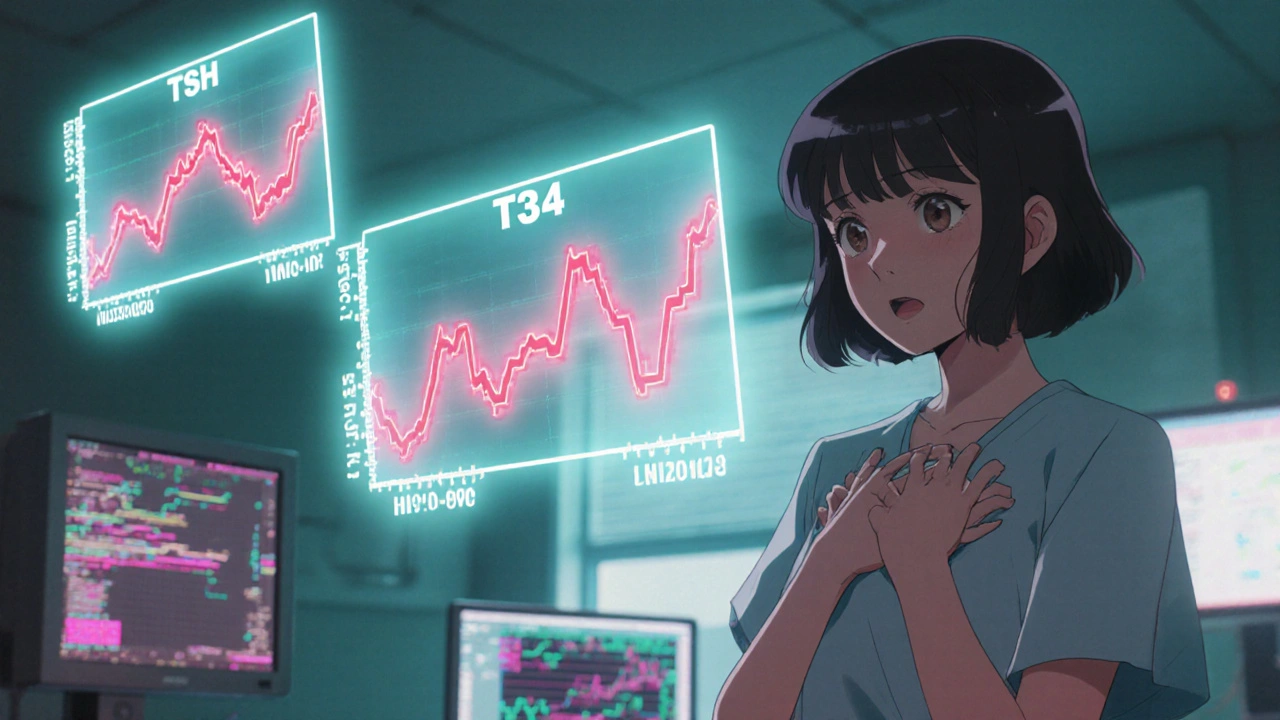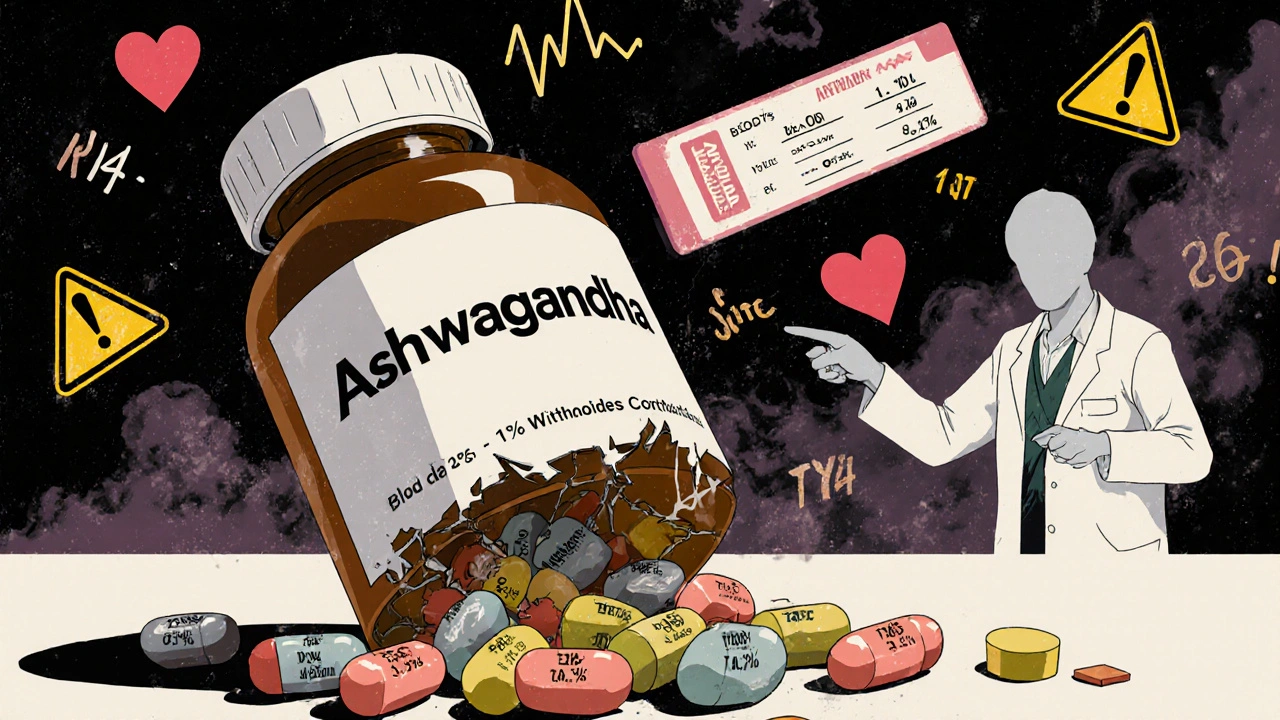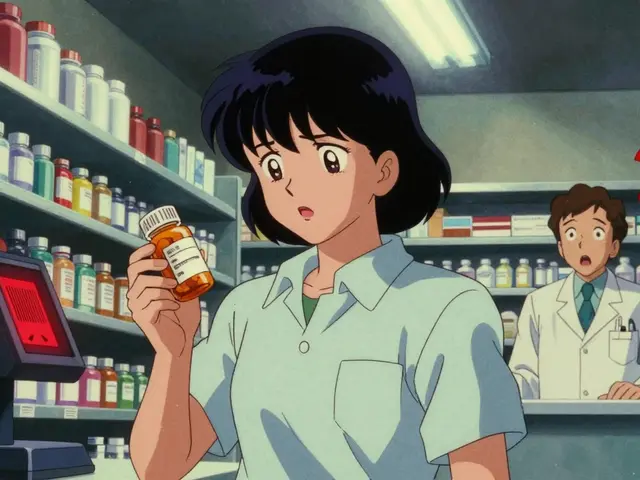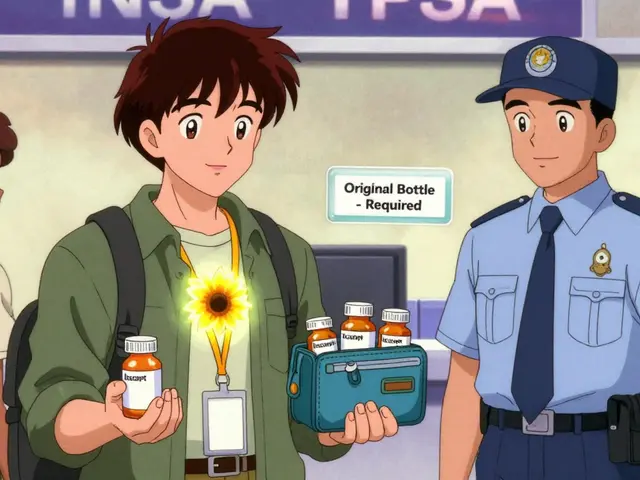Thyroid Medication & Ashwagandha Risk Calculator
Thyroid Medication Interaction Assessment
This tool estimates potential changes in thyroid hormone levels when taking ashwagandha with thyroid medication based on clinical study data. Important: This is a simplified model. Individual responses vary significantly.
Results
Important Warning: This tool is based on limited clinical data. Ashwagandha supplements vary widely in potency (1.2% to 7.8% withanolides). Your actual hormone changes may differ significantly. Consult your doctor before combining ashwagandha with thyroid medication.
When you’re managing hypothyroidism with levothyroxine, every pill matters. Your dose is fine-tuned over weeks or months until your TSH and free T4 levels sit just right. Then you start taking ashwagandha - a popular herbal supplement for stress and sleep - and suddenly, your heart races, you can’t sleep, and your last blood test shows TSH crashed to 0.05. That’s not a coincidence. It’s over-replacement, and it’s happening more often than most doctors realize.
What Ashwagandha Actually Does to Your Thyroid
Ashwagandha isn’t just a calming herb. It’s a powerful endocrine modulator. In a 2018 double-blind study of 50 people with subclinical hypothyroidism, taking 600 mg of standardized ashwagandha root extract daily for eight weeks increased T3 by 41.5%, T4 by 19.6%, and TSH by 17.5%. That’s not a minor nudge. That’s a full-on signal to your thyroid to produce more hormone - exactly what you’re trying to control with medication. The active compounds, withaferin A and withanolide D, stimulate the hypothalamic-pituitary-thyroid (HPT) axis. In people without thyroid medication, this can help normalize low hormone levels. But if you’re already on levothyroxine, you’re adding an unregulated, unpredictable boost to a system that’s been carefully balanced by your doctor.The Danger of Unregulated Supplements
Here’s the kicker: ashwagandha supplements aren’t regulated like drugs. The FDA doesn’t test them for purity, potency, or consistency. A 2021 test by ConsumerLab.com found the same branded product could contain anywhere from 1.2% to 7.8% withanolides - nearly a sixfold difference. One bottle might be mild. The next could be strong enough to push your thyroid into overdrive. Compare that to levothyroxine, which is dosed in precise micrograms (25 mcg to 300 mcg). You’re taking a medication that’s been measured to the millionth of a gram. Then you add a supplement that could be 5x stronger than what’s listed on the label. No wonder people end up with dangerously high T4 levels.Real Cases, Real Consequences
The American Association of Clinical Endocrinologists documented 12 cases of thyrotoxicosis - a medical emergency - directly linked to ashwagandha combined with thyroid medication. In these cases, T4 levels soared past 25 mcg/dL. Normal range? 4.5 to 12.0. TSH dropped below 0.01 mIU/L. Normal? 0.4 to 4.0. These aren’t theoretical risks. They’re documented emergencies. On patient forums, stories are common. One user on Thyroid Help Forum took 500 mg of ashwagandha with 100 mcg levothyroxine and saw their TSH plunge from 1.8 to 0.08. They developed palpitations and insomnia. Had to go to the ER. Another survey of 1,247 thyroid patients found 18.7% who took ashwagandha had clear signs of hyperthyroidism - 29 needed hospitalization for heart rhythm problems. Even if you feel fine, the damage can be silent. Elevated T3 and T4 over time increase your risk of atrial fibrillation, bone loss, and muscle wasting. And because ashwagandha has a half-life of about 12 days, its effects linger for 2-3 weeks after you stop taking it. That means your next thyroid test could still show abnormal results, even if you’ve already quit the supplement.
What Doctors Are Saying
Endocrinologists are united on this: avoid ashwagandha if you’re on thyroid medication. Dr. Angela Leung from UCLA’s Endocrine Clinic says it can cause “iatrogenic hyperthyroidism” - meaning your own treatment, combined with the supplement, is making you sick. Dr. Mary Hardy from Cedars-Sinai acknowledges ashwagandha’s benefits for people with untreated hypothyroidism, but adds: “The therapeutic window for thyroid medication is razor-thin. Adding an unregulated herb? That’s not a tweak. That’s a gamble with your heart.” The Endocrine Society’s 2023 guidelines are clear: patients on levothyroxine, liothyronine, or antithyroid drugs should avoid ashwagandha entirely unless under strict medical supervision - and even then, thyroid labs need to be checked every two weeks.Why People Think It’s Safe
Ashwagandha is marketed as “natural,” “stress-relieving,” and “safe for long-term use.” It’s sold next to vitamins in grocery stores. People assume if it’s on the shelf, it’s harmless. But “natural” doesn’t mean “safe with medication.” Willow bark is natural too - it’s aspirin’s ancestor. Just because something comes from a plant doesn’t mean it won’t interfere with your prescription. Plus, there’s the placebo effect. Some users report feeling better on ashwagandha - improved sleep, less anxiety. That’s real. But if you’re already on thyroid meds, your body might be responding to a hormone surge, not stress relief. You might think the supplement is helping, when it’s actually pushing you into hyperthyroid territory.What to Do If You’re Already Taking Both
If you’re currently taking ashwagandha and thyroid medication, don’t panic. But do act.- Stop taking ashwagandha immediately.
- Get your thyroid levels tested within 2-3 weeks. Don’t wait for your next scheduled appointment.
- Bring your supplement bottle to your doctor. Show them the label. They need to know the dose and brand.
- Don’t restart ashwagandha without a full thyroid panel and your doctor’s approval.








Pravin Manani
November 20, 2025 AT 18:05Ashwagandha’s effect on the HPT axis is well-documented in endocrinology literature-especially the withanolide-mediated upregulation of deiodinase type 1 activity, which amplifies peripheral T4-to-T3 conversion. When combined with exogenous levothyroxine, this creates a non-linear pharmacodynamic interaction where serum T3 levels can spike unpredictably. The 2018 RCT you cited? It’s the exact mechanism behind the documented thyrotoxicosis cases. The real issue isn’t the herb-it’s the lack of pharmacovigilance in OTC supplements. We’re treating a hormonal system like it’s a coffee maker.
Mark Kahn
November 21, 2025 AT 08:15Hey, I totally get where you're coming from-I was on levothyroxine for years and started ashwagandha because my sleep was trash. Felt amazing at first, then my heart started doing backflips. Went to my doc, got labs done, and boom-TSH at 0.03. Dropped the supplement, waited two weeks, and everything normalized. Just wanted to say: you’re not alone, and it’s not ‘just stress.’ Your thyroid is a precision instrument. Don’t let a trendy herb mess with it.
Leo Tamisch
November 23, 2025 AT 06:06How quaint. The modern age of biohacking has devolved into a cult of herbal mysticism wrapped in the false security of ‘natural’-as if the Enlightenment never happened. Ashwagandha? A Vedic placebo with pharmacokinetic teeth. The real tragedy isn’t the interaction-it’s that people believe they can self-diagnose and self-treat endocrine dysfunction with root extracts bought from a guy named ‘BlessedHerbs’ on Etsy. We’ve traded science for spirituality, and now our thyroids are collateral damage.
Daisy L
November 23, 2025 AT 10:10OH MY GOD. YES. I’ve been screaming this from the rooftops! I took ashwagandha with my Synthroid because ‘it’s natural’ and I woke up one morning feeling like my chest was being squeezed by a python. ER. A-fib. 24-hour monitor. My endo looked at me like I’d just set fire to the lab. I’m never touching that stuff again. And no-I don’t care if your yoga instructor swears by it. MY HEART IS NOT A SACRED COW. 🚫🌿🫀
Anne Nylander
November 24, 2025 AT 00:47i had no idea this could happen!! i was taking ashwagandha for anxiety and thought it was helping me sleep better… turns out i was just hyper! i went to the dr and they were like ‘did you take anything new?’ i said ‘yeah, that herb thing’ and they facepalmed. lol. i stopped it and felt normal again in like 10 days. just be careful out there!!
Franck Emma
November 25, 2025 AT 02:33I lost 3 months of my life because of this. Palpitations. Sweating. Insomnia. Thought I was having a heart attack. Turned out my T4 was 28. I didn’t even know ashwagandha could do that. Now I’m on beta-blockers and terrified of every supplement. Don’t be like me.
Eliza Oakes
November 25, 2025 AT 11:54Actually, I think this is all fearmongering. My cousin in India has been taking ashwagandha with thyroid meds for 8 years and she’s fine. Also, the FDA doesn’t regulate anything properly. Maybe the real problem is that doctors are too scared to admit herbs can be beneficial. You’re pathologizing natural healing because you’re trained to only trust Big Pharma. Wake up.
Clifford Temple
November 25, 2025 AT 14:33So you’re telling me some Indian herb is more dangerous than a prescription pill made in a lab? That’s a joke. We’re letting foreign supplements destroy American health while we sit here with our synthetic hormones like sheep. This is why we lost our medical sovereignty. Ashwagandha? It’s a Trojan horse from the Ayurvedic black market. Ban it. Regulate it. Or stop pretending we’re in charge of our own bodies.